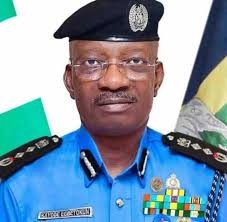Inspector-General of Police (IGP), Kayode Egbetokun, is currently facing serious health challenges linked to a kidney condition, Reporters has revealed. Multiple reliable sources have confirmed that the police chief, who previously underwent a kidney transplant while serving as a Chief Superintendent of Police (CSP), is now struggling to cope with the demands of his office while functioning with a single kidney.
Due to his health status, IGP Egbetokun reportedly keeps a reduced physical presence at the Force Headquarters in Abuja. According to insiders, he usually arrives around 1 p.m. and leaves early. However, he is said to remain actively engaged in police matters during nighttime hours, coordinating operations and administrative duties from a makeshift clinic at his residence.
In March 2025, IGP Egbetokun formally wrote to President Bola Ahmed Tinubu seeking approval to travel to the United Kingdom for an international conference, the Government Global Security Event on Home Office Security and Policing 2025. The event was scheduled to hold from March 11 to 13 and was to offer him a chance to participate in global law enforcement discussions while also seeking medical consultation. The letter, dated March 4, 2025, referenced an official invitation from the Deputy Defence Adviser at the British High Commission.
In the request, Egbetokun proposed that Deputy Inspector-General (DIG) Frank Mba would oversee police operations during his absence. However, President Tinubu reportedly turned down the request, allegedly due to rising internal pressure and political uncertainty surrounding Egbetokun’s continued stay as the IGP.
Sources suggest that the pressure to remove the police boss had intensified around that period. There were reports of growing dissatisfaction within the Nigeria Police Force (NPF) regarding his leadership style and decisions, particularly related to retirement policies and ongoing disciplinary actions.
In early 2025, Egbetokun ordered a probe into allegations that some senior police officers falsified their service records to extend their tenure. Critics argue that the timing of this investigation was suspicious, as it came only after Egbetokun himself had secured an extension of his tenure. This sparked concerns over bias and selective justice, further weakening confidence in his leadership.
Earlier in March 2024, several senior officers accused the IGP of discrimination, claiming he refused to reinstate colleagues who had been forcibly retired even after a court ruled in their favour. Many of these affected officers had not reached the official retirement age or completed the mandatory 35 years of service.
As questions continue to mount about his ability to lead, there are strong indications that DIG Idegwu Basil Okuoma is being considered as a possible replacement. DIG Okuoma, who previously served as Assistant Inspector-General in charge of Zone 14 (Katsina and Kaduna), is a seasoned officer with a robust academic background, including a PhD in Peace and Conflict Studies from the University of Ibadan.
Okuoma has held several critical roles, such as Commissioner of Police in charge of Election Planning and Deputy Commissioner of Police for Federal Operations at Force Headquarters, Abuja. His recent promotion to DIG has only added weight to speculation about his potential succession.
Egbetokun’s health condition, coupled with internal discontent and the sensitive nature of ongoing reforms within the police force, has placed him in a precarious position. While he continues to perform his duties in a limited capacity, the pressure from both within and outside the Force is intensifying.
The unfolding situation highlights the need for not only capable leadership but also transparent and fair administration within the Nigeria Police Force. As the nation faces rising insecurity and complex internal challenges, effective leadership in the top echelons of the police becomes even more critical.
